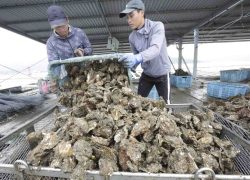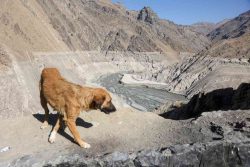
A scientist uses a near-infrared device on a pear to predict its best picking date as he works in a lab of the University of Leuven in Heverlee, Belgium, on Sept. 18.
13:24 JST, October 10, 2024
MAASMECHELEN, Belgium (Reuters) — In the Belgian province of Limburg, one of the orchards in the country’s pear-growing heartland stands out as unusual: a cluster of 12 transparent domes, perched high by a mirrored wall above the surrounding nature park.
Inside the domes, researchers are growing pears in a controlled environment that simulates how climate change will affect the region in 2040. Their aim is to see what global warming has in store for Europe’s fruit growers.
“We expect more heatwaves and less even precipitation, so more droughts and floods as well. And overall, slightly higher temperatures,” Francois Rineau, associate professor at the University of Hasselt, said of the simulated climate inside the domes.
Early results from the scientists’ first harvest in 2023 suggest Belgian pears may be spared some of the worst impacts of climate change — which scientists expect to cut some crop yields and hike growers’ costs for irrigation to combat drought.
“The effect of climate change at the 2040 horizon on the quality of pears was very minor. However, we found a difference in how the ecosystem was functioning,” Rineau said, noting that an earlier growing season in the 2040 simulation appeared to result in the ecosystem absorbing more CO2.
Year-to-year variability means that one year alone cannot capture intermittent extreme weather and other changes in the climate that can wreak havoc on crops. The three-year experiment will cover three harvests.
This year’s harvest of 2040-era pears is being studied at the Flanders Centre of Postharvest Technology (VCBT), to check the fruit’s size, firmness and sugar content — and compare this to pears grown in domes simulating today’s climate.
“If we have a higher temperature on the trees, pears tend to be less firm and have more sugar,” VCBT researcher Dorien Vanhees said.
That’s bad news for growers. Less-firm fruit survives a shorter period in storage, reducing the quantity of pears growers can sell.
Floods, hail and drought have already affected European pear growers in recent years, as climate change begins to leave fingerprints on growing patterns.
Belgium’s pear production is expected to plunge by 27% this year, according to the World Apple and Pear Association, owing to factors including an unusually early bloom and unusually late frost.
Top Articles in Science & Nature
-

Japan Institute to Use Domestic Commercial Optical Lattice Clock to Set Japan Standard Time
-

iPS Treatments Pass Key Milestone, but Broader Applications Far from Guaranteed
-

Record 700 Startups to Gather at SusHi Tech Tokyo in April; Event Will Center on Themes Like Artificial Intelligence and Robotics
-

iPS Cell Products for Parkinson’s, Heart Disease OK’d for Commercialization by Japan Health Ministry Panel
-

Japan to Ban Use of Power Banks on Airplanes
JN ACCESS RANKING
-

Japan PM Takaichi’s Cabinet Resigns en Masse
-

Japan Institute to Use Domestic Commercial Optical Lattice Clock to Set Japan Standard Time
-

Israeli Ambassador to Japan Speaks about Japan’s Role in the Reconstruction of Gaza
-

Man Infected with Measles Reportedly Dined at Restaurant in Tokyo Station
-

Videos Plagiarized, Reposted with False Subtitles Claiming ‘Ryukyu Belongs to China’; Anti-China False Information Also Posted in Japan
























